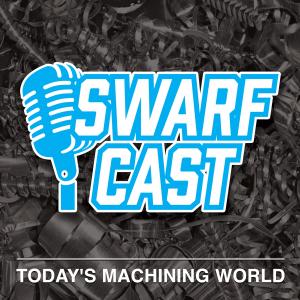Swarfcast

How to Create an Awesome Manufacturing Culture, with Jim Mayer–EP 222
“This is how it’s always been done.”
Businesses sometimes can do OK with a philosophy like that. Maybe even make good money.
But it sucks being just ok, because you know you could be so much better.
Today on the podcast we are joined by Jim Mayer, founder of the Manufacturing Connector and host of the Manufacturing Culture Podcast. Jim is a manufacturing advocate who helps companies break free from the “it’s always been done this way’ mindset.
He specializes in transforming workplaces where the culture is “just OK” into awesome places to work, where employees are engaged, people trust each other and they celebrate successes together.
It was a great conversation, he even gave me valuable advice about improving meetings at our company, Graff-Pinkert.
*************
Listen on your favorite podcast app using pod.link.
View the podcast at the bottom of this post or on our YouTube Channel.
Follow us on Social and never miss an update!Facebook: https://www.facebook.com/swarfcast
Instagram: https://www.instagram.com/swarfcast/
LinkedIn: https://www.linkedin.com/company/todays-machining-world
Twitter: https://twitter.com/tmwswarfblog
*************
Link to Graff-Pinkert’s Acquisitions and Sales promotion!
*************
Interview HighlightsNoah Graff: On your website you mentioned taking “OK” scenarios at manufacturing companies to a new place. Explain that.
Jim Mayer: “OK” in the sense that I use it means status quo. The way things have always been done. When I hear people say, “That’s the way things have always been done,” I see it as a sign of room for growth, opportunity, and improvement.
I can take what has always been done and provide a solution or a way to become better, become more profitable, become more process-oriented.
Noah: I know you don’t believe that a culture for one company is necessarily right for another. But how do you define a “healthy culture” in your surveys and when you’re consulting manufacturing companies?
Jim: The idea of organizational culture is that you have a good culture when your employees and your organization have alignment of values.
When your company values are X and your employees also value that same thing, that’s when you have alignment. That’s when you have a healthy culture for your organization.
It’s individualistic because every employee is going to have their own values. Every organization is going to have their own values based on the values of top-line leadership.
That’s why it’s not my job to judge. What I value may be different from what that company values or what the employees value. I’m just making sure they’re aligned.
Noah: How has remote work affected business culture and manufacturing culture?
Jim: Typically, what I find with the shops I work with, remote work is not accepted where it could be. Of course, folks on the shop floor can’t be remote, but they can have flexible hours more suited to their lifestyle and work-life balance needs.
It all comes down to what that individual is looking for. But remote culture in manufacturing can thrive.
It’s just a matter of trust. That’s really the foundation of why it doesn’t work. Leadership in this industry is so conditioned to have eyes on processes and people who are part of the processes. When they aren’t able to have eyes on somebody, the trust just isn’t there that they’re getting their job done.
Noah: One thing I’ve wanted to do more at our company, Graff-Pinkert, is have some huddles or meetings. We have never had anything routine. We are moving right now, and we’re going to have the added challenge of having a separate office and warehouse. I’d like to have some meetings to bring people together and be more engaged.
Jim: I would say start with a weekly meeting. But really define what that weekly meeting is designed to accomplish ahead of time. “Hey team, we’re going to have a weekly meeting where we talk about this week’s wins, this week’s failures, this week’s lessons learned.” You have to have that defined ahead of time so that people don’t walk into it thinking, “Why are we having this meeting? I have no idea.”
I always like to talk about celebrations. What were our successes? What were our opportunities for learning this week? When you take that kind of mindset, it changes the framework of the discussion.
But then also, the way that you create a culture that values those people and values that learning and development is asking them, “What were your failures and what did you learn?” What were some of the misses we had this week and what did you learn from them?
Companies that generally have healthier cultures don’t view failure as a mistake. They view failure as an opportunity to grow.
Questions:
What aspect of your company’s culture are you most proud of?
What aspect of your company’s culture would you like to improve?
*********
This transcription was aided by claud.ai. to improve readability.
For more information about Jim Mayer’s services go the manufacturing connector.






 Visit Podcast Website
Visit Podcast Website RSS Podcast Feed
RSS Podcast Feed Subscribe
Subscribe
 Add to MyCast
Add to MyCast